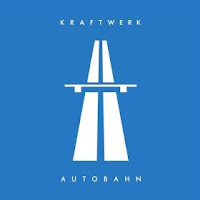Last weekend, however, in a direct attempt to stare down my remaining apprehensions about heavy lifting, I attended a CrossFit Olympic Lifting Instructors Course in Tuscon, Arizona. This was to be a quick solo trip, so any music I planned to bring for the plane ride and layovers would have to be in soft format. It seemed like an opportunity to give S U R V I V E a shot.
 This ended up being a smart move. While I still admit that I would like to see the album cover professionally printed and mounted in a jewel case, the content of the album is shady and immersive in a way that can best be delivered through earphones. I played S U R V I V E through my phone when I was walking around Tuscon, which ended up being quite a bit more than I had initially planned. Once I got a feel for the area between my hotel and CrossFit Works, I found that I preferred a 30 minute walk surrounded by distant mountains and an epic alien invasion soundtrack to an 8 minute (and $10) drive with an awkward Russian cabbie.
This ended up being a smart move. While I still admit that I would like to see the album cover professionally printed and mounted in a jewel case, the content of the album is shady and immersive in a way that can best be delivered through earphones. I played S U R V I V E through my phone when I was walking around Tuscon, which ended up being quite a bit more than I had initially planned. Once I got a feel for the area between my hotel and CrossFit Works, I found that I preferred a 30 minute walk surrounded by distant mountains and an epic alien invasion soundtrack to an 8 minute (and $10) drive with an awkward Russian cabbie.S U R V I V E takes more than one page from Jean Micheal Jarre’s early playbook, particularly the ethereal and dynamic Equinoxe, Oxygene, and Les Chantes Magetiques trilogy. Jarre was playful and exploratory on these synth masterpieces. In contrast, S U R V I V E conjures a dark, ominous, and almost gothic tone using the gloomy synth sounds of late 80s Depeche Mode. While other electronic projects like the F*ck Buttons might use more contemporary technology to produce a broader variety of sounds, S U R V I V E does a whole lot more musically with much less.
S U R V I V E is one of several local synth bands that orbit around the Austin vintage synth shop Switched On, and they are so underground that they almost don’t exist. There are a few reviews of their sporadic live shows that indicate that their performances are epic. Aside from these, some links that lead to album download, and an intermittently updated Facebook page, there is very little about S U R V I V E online. I can barely figure out if or when they are playing next, but I would be interested in seeing them live.
From what I have seen, however, they seem to have some sort of following in Germany. While that’s not too surprising, considering the history of synth music in what is Kraftwerk’s homeland, I have never had to do a Euros conversion to purchase an album from a local band before.
Not too long ago, I became a bit snobby about listening only to local music, because I was convinced that it held the potential to stand outside of the agenda of the record industry. “Independent music” is, paradoxically, more mainstream now, and has its own political agenda that musicians have to navigate. S U R V I V E is one of those bands that purposefully fly under the radar, doing something not for fortune or fame, but because they have a genuine love for what they do. They are clearly passionate about the untapped potentials of traditional analog synthesizers and their current relevance, and their adoration of these instruments infuses their music with conviction.



